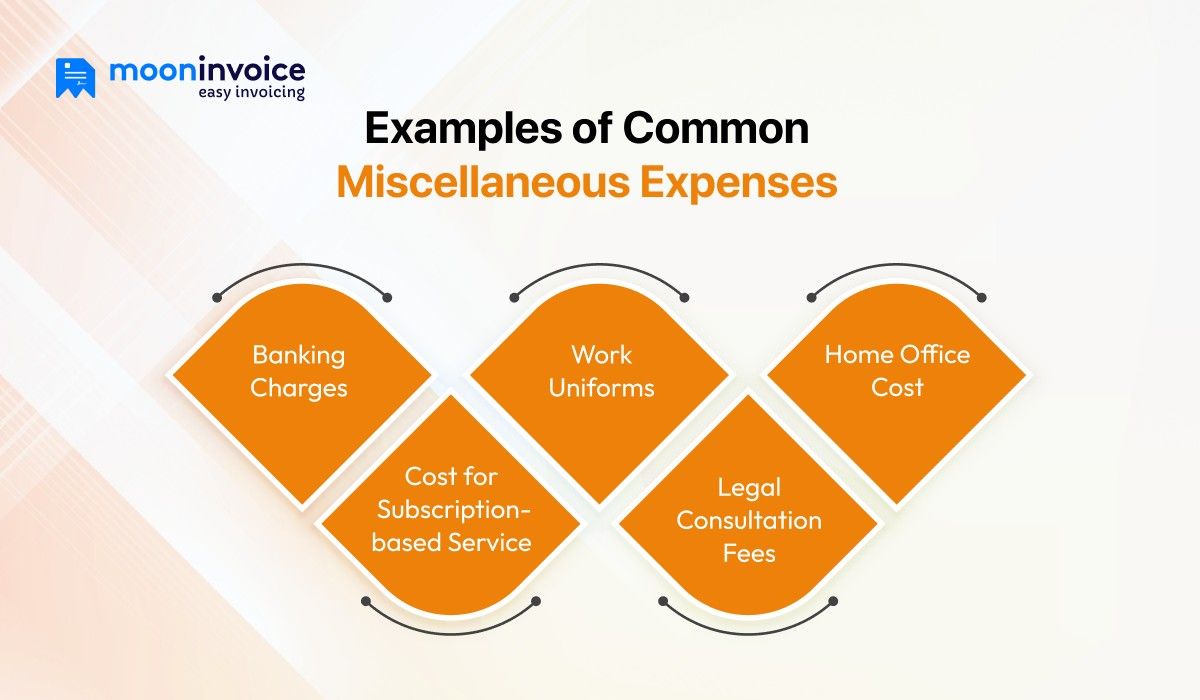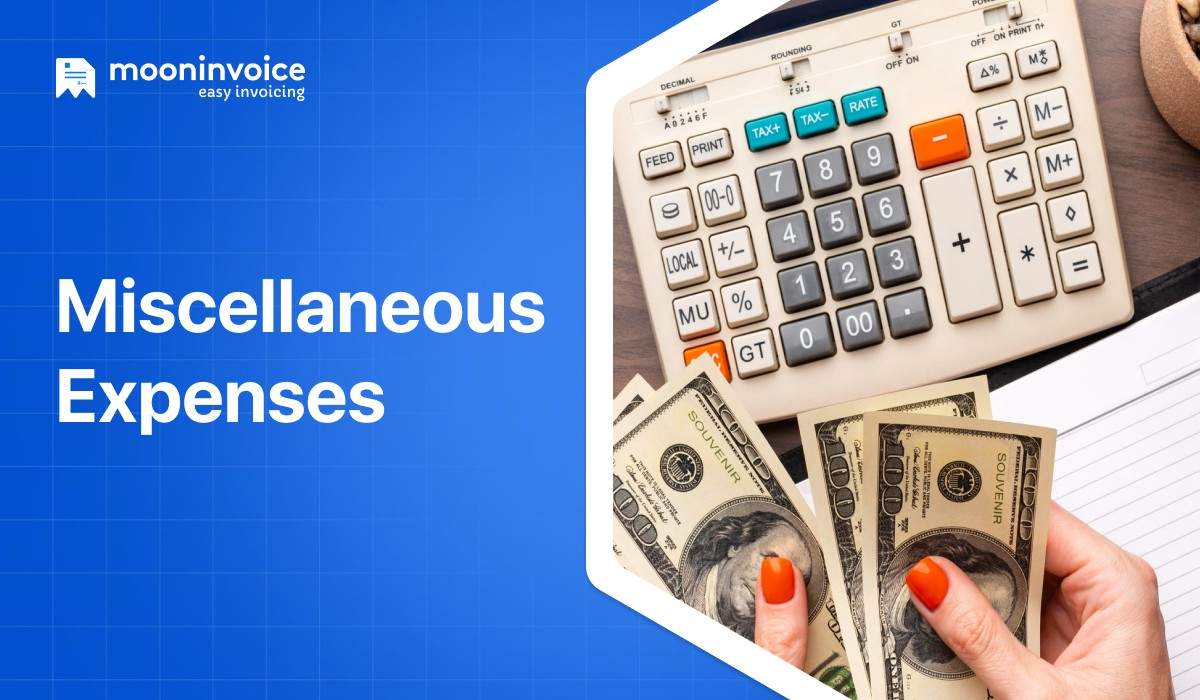Miscellaneous Expenses Meaning
Miscellaneous expenses are unpredictable costs that don’t fall into your standard categories and are incurred only occasionally, like urgent repairs or incidental travel.
Some expenses are those that you, as a business owner, never expect to incur, but have to deal with since they were necessary. You aren’t alone in encountering such unforeseen expenses.
You would have miscellaneous expenses not only in your business life but also in terms of your personal life that never existed in your budget before. However, you need to track each miscellaneous expense, regardless of high or low cost.
The reason is miscellaneous expenses can reduce your taxable income if they are deductible and necessary to operate your business. As a result, you can save enough money on taxes by a hundred dollars or maybe thousands.
But, the real question is what is a miscellaneous expense, and how to manage miscellaneous costs? We will answer your questions in this blog. So, buckle up as we dive deeper into miscellaneous business expenses.
What are Miscellaneous Expenses?
Miscellaneous expenses refer to irregular, typically minor costs that businesses incur for various purposes, such as equipment depreciation, processing bank transfers, or marketing activities. Also known as indirect expenses, these costs do not fall into your regular expense category and are usually overlooked when filing taxes.
However, you need to record such expenses in your general ledger for business expense tracking even if there are small transactions. If not, it may affect your cash flow. In case miscellaneous expenses are higher, you must record them in a separate ledger account.
Manage Expense Without Late-night Headaches
Start saving receipts of miscellaneous expenses in AI-powered invoicing software, Moon Invoice, to track and manage expenses easily.
Why Are Miscellaneous Expenses Important?
Small or big, miscellaneous expenses are important as far as your overall budget is concerned. Here’s why you should never overlook miscellaneous costs.
1. Financial Control
Managing expenses can give you more financial control, as you can figure out which ones are non-recurring and whether they will impact your business. You can even take necessary steps and reduce overspending. This means you can keep a tab on the cash flow and seal the leaks before money starts slipping away.
2. Monitoring New Trends
Keeping your business expenses well-organized helps you spot new spending trends. You can use expense reports to identify your changing spending patterns. This step will help you revise the budget plan and limit your unnecessary spending. Consequently, you will have more retained earnings.
3. Decision-Making
When you start managing miscellaneous expenses, it’s not just about keeping clear records in your book, but also about collecting valuable insights. Such practices help you uncover the time when you spend the most, and accordingly, you can make informed decisions. Hence, it goes far beyond bookkeeping duties.
4. Availing Tax Benefits
Overseeing misc expenses also means making sure you don’t miss out on tax deductions. Sometimes you may fail to recognize small tax deductions and end up paying more taxes. This can be avoided when you have proof that such expenses are related to your business. As a result, you can gain tax benefits.
5. Audit Readiness
Miscellaneous expenses, when left untracked, can raise red flags for auditors. Therefore, it becomes crucial to record and manage expenses in a way that auditors take less time verifying entries and ensuring compliance. That’s how managing expenses periodically takes the stress out of a last-minute audit.
💡Also Read:
Tax-Deductible Miscellaneous Expenses
Alright, let us discuss what are miscellaneous costs that are tax deductible, lowering your overall taxable income.
1. Courier Charges
In case you send documents or packages to your team via courier, you will need to pay the courier charges. These charges are a part of tax-deductible miscellaneous expenses. Tracking them religiously aids in reducing tax payables.
2. Office Supplies
Everyday essentials you need to run your business also fall into tax deductible expenses. Computers, chairs, printers, and several other stationery items are ideal examples of such expenses, which help you get more tax benefits.
3. Business Travel
Unplanned travel related to your business work can also be recognized as tax deductible expenses. So, if you are travelling to attend business meetings, always keep hotel bills, airline tickets, or other receipts with you in order to claim tax deductions. By doing so, you can prove that it was related to business and not personal leisure.
4. Machine Replacement
Sometimes your in-house equipment, machine, or tools stop working suddenly, prompting you to replace or repair them as quickly as possible. In that case, you can keep a record of required expenses to carry out the necessary work and later claim tax deductions. However, make sure the machine or tool is only used for business-related work.
Examples of Common Miscellaneous Expenses

Now, here let us look at some miscellaneous expenses examples to clear up your confusion.
1. Banking Charges
The extra charges levied when conducting bank transfers from one account to another are one type of miscellaneous expense. They will not benefit your business in any way and hence, they are expelled from the list of tax deductible. You can’t submit claims for reducing taxes with banking charges.
2. Cost for Subscription-based Service
Subscription charges incurred for purchasing software or studying courses will come under miscellaneous expenses. Remember you can claim deductions only if you prove they are for business-related activities. Otherwise, subscription charges are typically considered miscellaneous expenses, offering no benefits in business taxable income.
3. Work Uniforms
Employees’ Uniforms required to be worn at the time of job falls under the miscellaneous category. However, they can be claimed only if they are being used to carry out business tasks. Suppose you buy jeans and t-shirts to wear while performing work assignments, they are miscellaneous expenses. Whereas, if you buy a helmet for safety concerns, it can be deductible.
4. Legal Consultation Fees
Fees paid to outside legal professionals for helping your business comply with state laws and regulations are considered a miscellaneous expense. If you pay fees to a legal advisor for helping you lodge a plea of income tax assessment, then also it will be counted as miscellaneous. You can deduct taxes only if you can prove it is related to business. Or else, you might receive penalties.
5. Home Office Cost
Several items purchased for office use such as pens, books, archive boxes and other documents are another example of miscellaneous expenses. Even if you have turned some parts of your home into an office workspace, the cost incurred for office suppliers goes to miscellaneous expenses and can’t be claimed for tax deductions.
6. Small Equipment & Tools
Even though it is necessary for your business, the cost incurred for purchasing small-size equipment is something that can’t be used for deducting taxes. Let’s say you brought a calculator for invoicing or accounting purposes, then the cost of the calculator will be a miscellaneous expense. The IRS thinks you are not using a calculator for business activities even if you do.
💡Need to know:
How to Manage Your Miscellaneous Expenses
Here are effective ways to manage your miscellaneous expenses and make sure you have a 360-degree view of cash flow activities.
1. Record Expenses Digitally
Start recording miscellaneous expenses using automation tools instead of generating paper reports. You can instantly add expense receipts digitally using tools, so you don’t have to make a separate ledger account. Adopt new tools or software that help you store paperless miscellaneous expenses in the cloud, leaving no chance of misplacement.
2. Real-time Expense Tracking
Create a digital expense report in a jiffy to get real-time updates on spending. A paperless expense report enables you to analyze irregular costs incurred and quickly find if they qualify for tax deduction. The process involves just a few taps on your smartphone, and you can zoom into expense reports on the go.
3. Include in Your Budget
Another thing is, don’t forget to consider miscellaneous costs when developing a new budget plan. Despite having nothing to do with your categorized expenses, leaving them out of the budget can still disrupt your financial flow. As a result, you can develop a solid budget plan and be prepared for surprises that often come out of nowhere.
4. Account for Tax Deductions
Apart from the budget plan, think about tax deductions you want to claim during the tax season. So, whether you prepare an expense report on paper or digitally, make sure you account for tax deductions. Also, if needed, you can approach a tax professional to seek their advice, especially when there are changes in tax laws.
5. Invest in Software
Get robust expense management software that can help you save expense receipts without any paperwork. Automation software like Moon Invoice is making heads turn with its advanced features, affordable pricing, and unmatched user-friendliness. It can be your go-to software as far as expense tracking is concerned. Importantly, it is an efficient way to manage expenses rather than handling things manually.
Control Your Business Spending With AI-Ready Moon Invoice
Be it miscellaneous expenses or well-categorized expenses, business expenses can badly affect your productivity if you fail to control them. Moon Invoice’s AI-powered automation can help.
With Moon Invoicing having your back, you can centralize your expenses in a single platform. What’s interesting is that you can scan the physical receipt with an AI-enabled feature, a quick scan, or a receipt scanner, to log expenses without manual entries.
It offers real-time visibility so that you can have a magnified view of what are recurring and non-recurring costs, helping you gain more control over the business finances.
You can even create paperless expense reports to learn your spending patterns and make strategic decisions that benefit your business. In short, you never lose financial control as long as you have Moon Invoice.
Conclusion
Unlike other business costs, miscellaneous expenses are the ones that do not qualify as tax-deductible because they are not tied to your business production or overhead cost. But, that doesn’t mean you overlook those infrequent expenses. Small or large, any miscellaneous expense should go directly to your general ledger.
With miscellaneous expenses on your record, you can claim for tax deduction if possible, improve cash flows or even streamline the reimbursement process.
Now you know the miscellaneous expenses meaning and why monitoring them is so crucial. If not manually, try using software like Moon Invoice to facilitate expense tracking and management without wasting your time and effort. Utilize a limited-days free trial to know how we made expense tracking a breeze.















